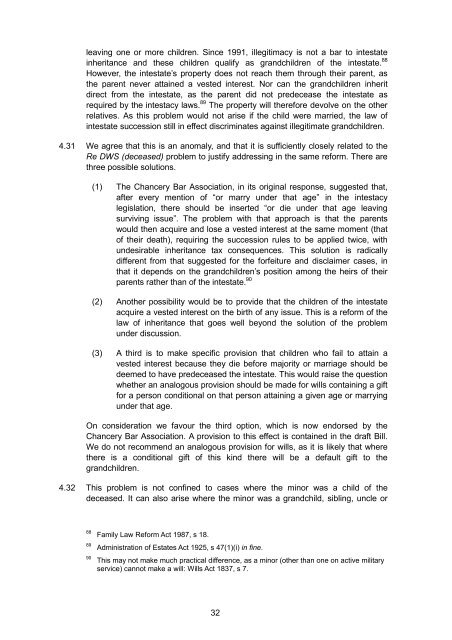The Forfeiture Rule and the Law of Succession ... - Law Commission
The Forfeiture Rule and the Law of Succession ... - Law Commission
The Forfeiture Rule and the Law of Succession ... - Law Commission
Create successful ePaper yourself
Turn your PDF publications into a flip-book with our unique Google optimized e-Paper software.
leaving one or more children. Since 1991, illegitimacy is not a bar to intestate<br />
inheritance <strong>and</strong> <strong>the</strong>se children qualify as gr<strong>and</strong>children <strong>of</strong> <strong>the</strong> intestate. 88<br />
However, <strong>the</strong> intestate’s property does not reach <strong>the</strong>m through <strong>the</strong>ir parent, as<br />
<strong>the</strong> parent never attained a vested interest. Nor can <strong>the</strong> gr<strong>and</strong>children inherit<br />
direct from <strong>the</strong> intestate, as <strong>the</strong> parent did not predecease <strong>the</strong> intestate as<br />
required by <strong>the</strong> intestacy laws. 89 <strong>The</strong> property will <strong>the</strong>refore devolve on <strong>the</strong> o<strong>the</strong>r<br />
relatives. As this problem would not arise if <strong>the</strong> child were married, <strong>the</strong> law <strong>of</strong><br />
intestate succession still in effect discriminates against illegitimate gr<strong>and</strong>children.<br />
4.31 We agree that this is an anomaly, <strong>and</strong> that it is sufficiently closely related to <strong>the</strong><br />
Re DWS (deceased) problem to justify addressing in <strong>the</strong> same reform. <strong>The</strong>re are<br />
three possible solutions.<br />
(1) <strong>The</strong> Chancery Bar Association, in its original response, suggested that,<br />
after every mention <strong>of</strong> “or marry under that age” in <strong>the</strong> intestacy<br />
legislation, <strong>the</strong>re should be inserted “or die under that age leaving<br />
surviving issue”. <strong>The</strong> problem with that approach is that <strong>the</strong> parents<br />
would <strong>the</strong>n acquire <strong>and</strong> lose a vested interest at <strong>the</strong> same moment (that<br />
<strong>of</strong> <strong>the</strong>ir death), requiring <strong>the</strong> succession rules to be applied twice, with<br />
undesirable inheritance tax consequences. This solution is radically<br />
different from that suggested for <strong>the</strong> forfeiture <strong>and</strong> disclaimer cases, in<br />
that it depends on <strong>the</strong> gr<strong>and</strong>children’s position among <strong>the</strong> heirs <strong>of</strong> <strong>the</strong>ir<br />
parents ra<strong>the</strong>r than <strong>of</strong> <strong>the</strong> intestate. 90<br />
(2) Ano<strong>the</strong>r possibility would be to provide that <strong>the</strong> children <strong>of</strong> <strong>the</strong> intestate<br />
acquire a vested interest on <strong>the</strong> birth <strong>of</strong> any issue. This is a reform <strong>of</strong> <strong>the</strong><br />
law <strong>of</strong> inheritance that goes well beyond <strong>the</strong> solution <strong>of</strong> <strong>the</strong> problem<br />
under discussion.<br />
(3) A third is to make specific provision that children who fail to attain a<br />
vested interest because <strong>the</strong>y die before majority or marriage should be<br />
deemed to have predeceased <strong>the</strong> intestate. This would raise <strong>the</strong> question<br />
whe<strong>the</strong>r an analogous provision should be made for wills containing a gift<br />
for a person conditional on that person attaining a given age or marrying<br />
under that age.<br />
On consideration we favour <strong>the</strong> third option, which is now endorsed by <strong>the</strong><br />
Chancery Bar Association. A provision to this effect is contained in <strong>the</strong> draft Bill.<br />
We do not recommend an analogous provision for wills, as it is likely that where<br />
<strong>the</strong>re is a conditional gift <strong>of</strong> this kind <strong>the</strong>re will be a default gift to <strong>the</strong><br />
gr<strong>and</strong>children.<br />
4.32 This problem is not confined to cases where <strong>the</strong> minor was a child <strong>of</strong> <strong>the</strong><br />
deceased. It can also arise where <strong>the</strong> minor was a gr<strong>and</strong>child, sibling, uncle or<br />
88 Family <strong>Law</strong> Reform Act 1987, s 18.<br />
89 Administration <strong>of</strong> Estates Act 1925, s 47(1)(i) in fine.<br />
90 This may not make much practical difference, as a minor (o<strong>the</strong>r than one on active military<br />
service) cannot make a will: Wills Act 1837, s 7.<br />
32
















